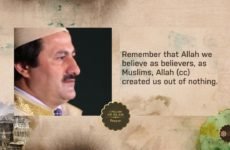Greetings and As-salamu alaikum,
We continue to talk about five pillars of Islam and how the entire tradition of Islam, how the belief system of Islam developed over last 400 years is built on primarily this five pillars where the faith in theory turns into action, turns into physical commitment. And we talked about the first pillar, the testimony, believing in God’s Oneness, and the Prophethood, and Messenger-hood, final Messenger-hood of Prophet Muhammad. And how five daily prayers are so central in establishing the devotional, confessional and spiritual life of a Muslim. Men and women five times a day stop their life and connect with their Lord, with God Almighty.
And we talked about how that individual journey manifests itself as a social, ethical, moral responsibility for fellow human beings and even creatures. How Zakat, a religious tax out of your wealth, out of your time, out of your health, out of your knowledge is required to share with people who are less privileged than you. And how religion requires you to do so. It’s not optional but a religious commitment. A mandatory prescribed religious tax.
It’s a universal act of discipline to work on your self, to work on your body, to work on your carnal desire, to a) create an empathy towards people who are not able to eat food three, four, five times a day that many of us in this part of the world do, b) also relying your dependence on God Almighty and also working on your spiritual muscles.
This is a term that I love to use about Ramadan. Ramadan is nothing but a month long spiritual gym where you go there and exercise and try to build those spiritual muscles to be able to connect with God and feel the presence of God in your life again.
Jews do this. Jewish community, what they are trying to do once a week for Shabbat, what the Christian community is trying to do during the season of Lent, and Buddhist and Hindu communities carve out, at particular time in that calendar and they do more intentional, more deliberate way of connecting to Divine and try to build a habit. One of the most important aspects of Ramadan is a habit building, habit forming, spiritual habits, devotional habits.
Every Muslim by the end of the Ramadan, they always feel why don’t I live like this? Why don’t I read as much Quran as I do during Ramadan the rest of the year? Why am I not giving as much charity for the rest of the year that I do in Ramadan? Why am I not so much more intentional as I’m always in Ramadan with my relationship with God Almighty?
So in every 11 months, this intentional deliberate time frame is given to Muslim, men and women, anybody who’s above the age of puberty to stop eating, drinking during the daylight hours. And abstaining from legitimate things which is normal and which is allowed, and which is permissible throughout the year but at that moment abstaining for the sake of God, for the seek of pleasure of God in their life.
So, but Ramadan is far from being starving for number of hours in a day. Ramadan is supposed to pump gratitude, thankfulness and empathy into your heart. Prophet Muhammad says
“You will never be able to go to heaven unless you are a believer. And you will never be able to be a true believer if your neighbor goes hungry as you go to bed with a full stomach”.
But how are you gonna be able to understand hundreds of millions of fellow human being who getting a daily sustenance, daily bread is a challenge? How are you going to empathize with somebody starving is a way of life that day and night getting a clean cup of water or a full meal is a challenge?
So Muslims literally try to walk in the shoes of hundreds of millions of human being as we talked today where starving is a way of life. And for the whole month they try to empathize those individuals and work on their muscles of spirituality and muscles of charity where most of the Zakat and additional, optional Sadaka as we call it, is spent by Muslims during the month of Ramadan.
One another important aspect of Ramadan also to evaluate your last 11 months and plan next 11 months. So in many ways, Ramadan is a month of auditing. Imagine like an IRS auditing where you basically carve out a special intention deliberate time in your life. Slow down and try to get deeper connection, deeper roots with the ethical, moral teachings of your religion. And try to evaluate your life in light of those ethical moral teachings.
You look back last 11 months of your life. What are pluses? What are the minuses? I am 42 years old. Where am I in my journey to my Lord? In the day of Resurrection, what kind of a book of life, what kind of life script will be presented to me? Where am I in my journey of the long list of thing that I’m supposed to do in my ability to be a person of mercy, person of compassion, person of grace towards me, towards my family members, towards the rest of the humanity?
Again were am I again in the long list of things that I’m not supposed to do? Where is my resistance against lying, cheating, being fateful? And where am I in my grace and charity towards my family members, my respect to my parents?
So for the month of Ramadan, Muslims evaluate their life and basically see where are the weak points? Where are the points and patterns where they consistently succeed and try to stick with those? And where are the patterns in their religious and moral life where they are not necessarily as successful? Where are the rooms for improvement where they need to try harder? And what are the resources in Islamic teachings, in Islamic scripture and 1400 years of Islamic tradition where they can improve?
So for the whole month, Muslims get an opportunity as a religious commandment, as a religious mandate to go back and check the books and see where they are and plan the next 11 months, until the next Ramadan, to be able to come up with a better life and better journey so that every action they take in their life, religious and secular, will bring them a step closer to God Almighty.
























